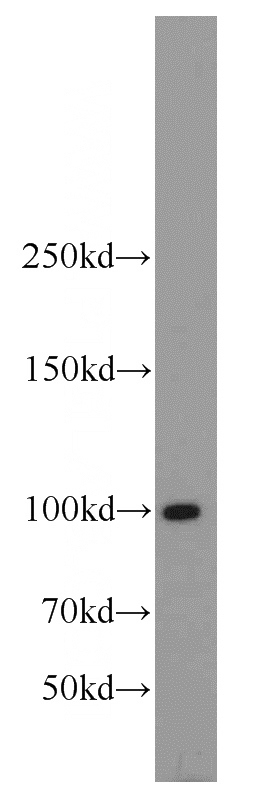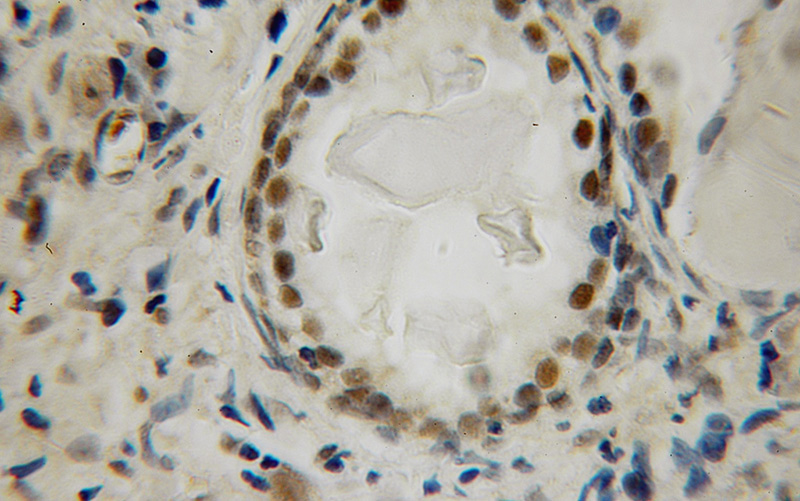-
Product Name
LIG4 antibody
- Documents
-
Description
LIG4 Rabbit Polyclonal antibody. Positive IHC detected in human prostate cancer tissue, human testis tissue. Positive WB detected in mouse testis tissue, HeLa cells, HepG2 cells, mouse liver tissue, rat testis tissue. Observed molecular weight by Western-blot: 100-104 kDa
-
Tested applications
ELISA, WB, IHC
-
Species reactivity
Human, Mouse; other species not tested.
-
Alternative names
DNA ligase 4 antibody; DNA ligase IV antibody; LIG4 antibody; ligase IV antibody; DNA antibody; ATP dependent antibody
-
Isotype
Rabbit IgG
-
Preparation
This antibody was obtained by immunization of LIG4 recombinant protein (Accession Number: NM_002312). Purification method: Antigen affinity purified.
-
Clonality
Polyclonal
-
Formulation
PBS with 0.1% sodium azide and 50% glycerol pH 7.3.
-
Storage instructions
Store at -20℃. DO NOT ALIQUOT
-
Applications
Recommended Dilution:
WB: 1:200-1:2000
IHC: 1:20-1:200
-
Validations

mouse testis tissue were subjected to SDS PAGE followed by western blot with Catalog No:112222(LIG4 antibody) at dilution of 1:600

Immunohistochemical of paraffin-embedded human prostate cancer using Catalog No:112222(LIG4 antibody) at dilution of 1:100 (under 10x lens)
-
Background
Two major pathways, homologous recombination (HR) and nonhomologous end joining (NHEJ), counteract one of themost toxic lesions, the DSB. The core protein complex mediating NHEJ in mammals includes DNA ligase IV (Lig4). Lig4 belongs to an ATP-dependent DNA ligase family, and joins single-strand breaks in a double-stranded polydeoxynucleotide in an ATP-dependent reaction. The complex Lig4-XRCC4 is responsible for the NHEJ ligation step, and XRCC4 enhances the joining activity of Lig4. Read more about this antibody on the blog: http://blog.ptglab.com/index.php/proteintechs-anti-neil3-antibody-used-investigate-mechanisms-of-dna-repair/?preview=true
-
References
- Paran N, De Silva FS, Senkevich TG, Moss B. Cellular DNA ligase I is recruited to cytoplasmic vaccinia virus factories and masks the role of the vaccinia ligase in viral DNA replication. Cell host & microbe. 6(6):563-9. 2009.
- Cousin W, Ho ML, Desai R. Regenerative capacity of old muscle stem cells declines without significant accumulation of DNA damage. PloS one. 8(5):e63528. 2013.
- Xing M, Yang M, Huo W. Interactome analysis identifies a new paralogue of XRCC4 in non-homologous end joining DNA repair pathway. Nature communications. 6:6233. 2015.
- Dong H, Shi Q, Song X. Polychlorinated biphenyl quinone induces oxidative DNA damage and repair responses: The activations of NHEJ, BER and NER via ATM-p53 signaling axis. Toxicology and applied pharmacology. 286(1):10-6. 2015.
- Guo C, Nakazawa Y, Woodbine L. XRCC4 deficiency in human subjects causes a marked neurological phenotype but no overt immunodeficiency. The Journal of allergy and clinical immunology. 136(4):1007-17. 2015.
Related Products / Services
Please note: All products are "FOR RESEARCH USE ONLY AND ARE NOT INTENDED FOR DIAGNOSTIC OR THERAPEUTIC USE"
